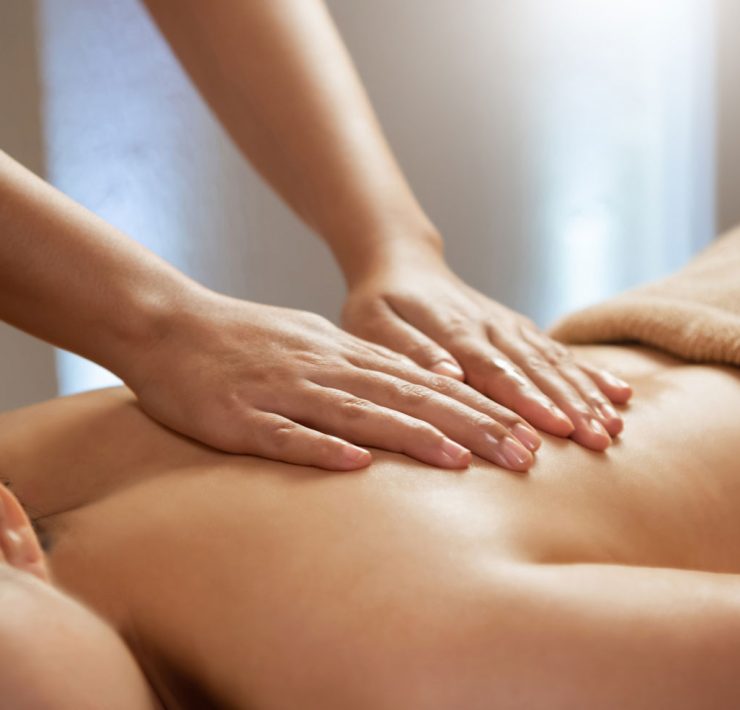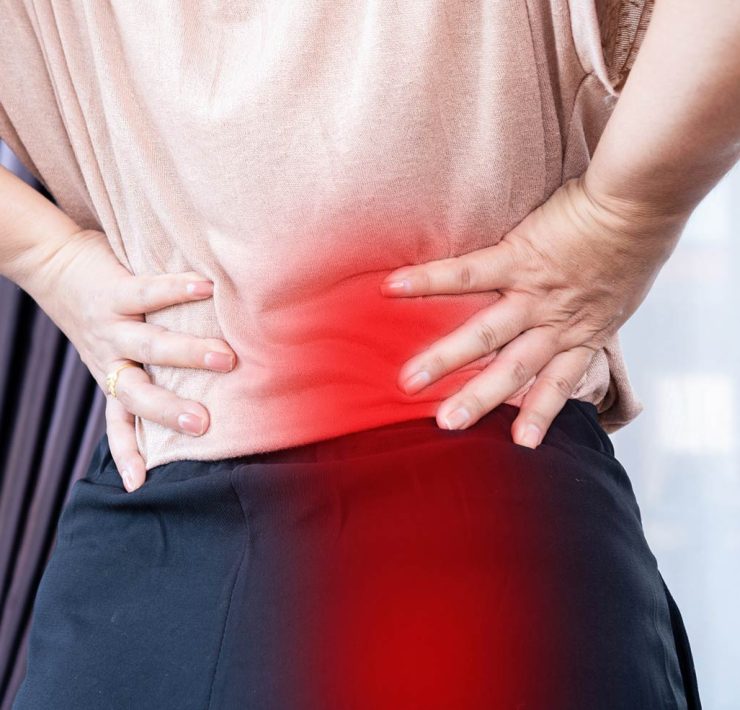A pinched nerve occurs when there is increased pressure applied to it by its surrounding tissues like muscles, tendons, bones, intervertebral disc or cartilage. This creates an uncomfortable sensation and may cause such symptoms as:
- Localized pain that may radiate out from the affected area
- Pins and needles
- Numbness
- Tingling
- Burning sensation
- Weakness in nearby muscles and joints
A pinched nerve can occur in any area of the body, though it’s most commonly experienced in the elbows, lower back, neck, wrists, and shoulders. A few examples of specific pinched nerve conditions include:
- Carpal tunnel syndrome: occurs when there is pressure on the median nerve, affecting the hands and arms
- Thoracic radiculopathy: occurs when the nerve root in the thoracic area of the spine is compressed, which can cause pain in the chest and torso area.
- Ulnar neuropathy (or “funny bone”): occurs when there is pressure on the ulnar nerve, affecting the hands—more specifically, the 4th and 5th fingers.
While many pinched nerves will resolve on their own or with self-treatment, some more serious cases will require professional care. Here are the most effective, at-your-fingertips treatments for a pinched nerve:
Ice and Heat Therapy
Ice therapy and heat therapy each have their own distinct purposes and benefits.
If your pain is new, ice therapy is the route that can provide significant relief, reduce swelling and decrease nerve conduction. It’s recommended to wrap an ice pack (or a bag of frozen veggies) in a cloth and place it over the affected area for 10-20 minutes at a time.
Heat application is a better option once the initial pain has begun to subside. Heat therapy increases the body’s temperature in the targeted area, encouraging blood flow and circulation and relaxing the muscles surrounding the affected nerve. This may help ease pain and discomfort as well as promote healing in the affected tissues. Ice can and should be continued as long as there is pain, swelling, or inflammation. A heating pad or warm compress can be applied for 15 to 20 minutes at a time.
Posture Optimization
Poor posture while sitting or standing for extended periods can put unnecessary stress on the body and actually worsen the pinched nerve or may even be the root cause of one. Frequently change your positions throughout the day to help prevent the onset of a pinched nerve. While you are sitting, pay attention to your body position and try to maintain a good posture, reducing the frequency of leg crossing and not leaning on your elbows. Also, try using a pillow(s) or neck rest for support. Sitting on an adjustable chair can help you maintain a good posture and relieve pressure on the affected nerve as well.
Yoga and Stretching
Gentle stretching and some yoga positions may help relieve pressure and tension in the affected area. For example, positions like child’s pose, cat/cow pose, or downward dog can effectively relieve the neck or lower back. It is important not to stretch too deeply though, not to worsen or further damage the nerve. Listen to your body. Stop immediately if symptoms increase. Remember, small movements can have a big impact.
OTC Pain Relievers
Over-the-counter pain medications like non-steroidal anti-inflammatory drugs (NSAIDs) such as ibuprofen (Advil, Motrin IB) or aspirin (Bufferin) can help reduce swelling and relieve pain in cases of minor pinched nerves.
It is important to consult with your doctor for dosage recommendations and any potential interactions before going this route.
Massage or Physical Therapy
Having a massage that places gentle pressure around the pinched nerve area may help relieve tension and reduce pain. A full-body massage can also help your body relax and aid healing. However, try to avoid deep tissue massages as the intense pressure can cause symptoms to worsen.
Physical therapy that involves a combination of targeted exercise, massage, and gentle stretches can also prove effective at relieving symptoms. It can assist in addressing range of motion and postural deficits that may be contributing to your symptoms. Book physical therapy at home (NYC Metro only)
Splint
A splint is an orthopedic device used to immobilize the injured body part and protect it from further injury. This is a common treatment for pinched nerves in the wrists and hands. Many people sleep with the splint on to prevent irritation and take pressure off the nerve that can result from unconsciously curling your wrist or bending your hand into an unfavorable position. Splints are therefore a convenient treatment method that can provide significant relief from symptoms and accelerate the healing process. It is best to consult with a professional for its proper use.
Workstation Improvement
Ever heard of a standing desk? These workstations are excellent for promoting more mobility and movement of the spine by forcing you out of the physical monotony of sitting in one position throughout the day. Incorporating movement while you work can both prevent and treat a pinched nerve in the torso or lower body by relieving pressure on the area – as they say ‘the best position is the next position’!
Also beginning to use ergonomic principles at work and at home, like raising the computer monitor to eye level can help alleviate neck pain. If your work requires you to perform repetitive activities, become diligent about taking regular breaks or rest periods which will help with improving your pinched nerve symptoms and prevent the risk of further injury.
Experiment with various settings and see what works best for you to relieve pressure on the pinched nerve.
Rest and Sleep
The most frequently recommended treatment for a pinched nerve is to rest the affected area. Our body repairs itself during sleep so giving it more time to do this may help relieve symptoms quicker. In many cases resting and sleep are enough for the pinched nerve to heal on its own, but try not to sleep in a position that applies pressure on the affected nerve.
It is also important not to overuse the nerve in any way as this can cause further damage. Your doctor may ask you to stop any physical activities like exercise or sport that’ll aggravate and add extra pressure to the affected area. Regular activity should be resumed slowly and you should pay attention to how it feels. If you feel the pain increasing, stop the activity immediately.
Exercise
Low-impact exercises like walking, swimming, and Tai Chi are great options for improving your pinched nerve symptoms, promoting mobility and are a key part of the long-term solution. Walking in a pool is ideal, due to its gravity-reducing effect, which can help relax the inflammation and relieve pressure on the nerve.
Tai Chi’s gentle flowing movements can also help alleviate pain by reducing nerve compressions in both the neck and back. Side benefits include increased overall strength, balance, and flexibility.
Once your doctor clears you and you’re feeling up for it, add some resistance training to your routine as well. This will help strengthen the muscles around the pinched nerve which will alleviate pressure against that nerve. Losing any excess weight can also help reduce pressure on the nerves – which can be achieved by making changes to your diet by incorporating more healthful foods and reducing caloric intake, along with exercise.
Make sure to warm up before or after your exercises, to help keep the body flexible and reduce any pressure and inflammation that can occur near the nerves while exercising.
Book assisted stretching at home (NYC Metro only)
If your pain is severe, constant, keeps returning, and lasts for more than a few days, you should go see a doctor who can examine the area and suggest the best treatment option for you. You should also see a doctor immediately if you have a pinched nerve that:
- Affects your bowel or bladder
- Prevents you from grabbing things or causes you to drop things
- Causes weakness in the muscle or numbness
It’s important to keep your body in check and ensure you think long-term when it comes to all your health and wellness regimens—especially if you have pre-existing conditions like diabetes, obesity, or rheumatoid arthritis, which can increase your risk of a pinched nerve. Something that bugs you a little today can become a much more serious problem if not addressed at the source with your whole health in mind, so don’t be shy about consulting a medical professional if you think something isn’t right.

Reviewed by John Gallagher, PT, DPT, CEAS. Dr. Gallagher is a licensed physical therapist with over two decades of experience focusing on orthopedics, ergonomics, and sports rehabilitation. Meet our Editorial Review Board.







